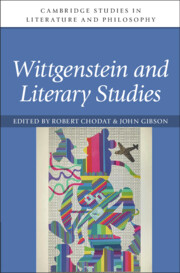Book contents
- Wittgenstein and Literary Studies
- Cambridge Studies in Literature and Philosophy
- Wittgenstein and Literary Studies
- Copyright page
- Contents
- Contributors
- Abbreviations of Wittgenstein’s Major Works
- Introduction
- 1 Writing after Wittgenstein
- 2 A Wittgensteinian Phenomenology of Criticism
- 3 Appreciating Material
- 4 A Vision of Language for Literary Historians
- 5 Wittgenstein and the Prospects for a Contemporary Literary Humanism
- 6 Storied Thoughts
- 7 Wittgenstein and Lyric
- 8 Life, Logic, Style
- 9 Wittgenstein’s Apocalyptic Subjectivity
- Index
6 - Storied Thoughts
Wittgenstein and the Reaches of Fiction
Published online by Cambridge University Press: 05 December 2022
- Wittgenstein and Literary Studies
- Cambridge Studies in Literature and Philosophy
- Wittgenstein and Literary Studies
- Copyright page
- Contents
- Contributors
- Abbreviations of Wittgenstein’s Major Works
- Introduction
- 1 Writing after Wittgenstein
- 2 A Wittgensteinian Phenomenology of Criticism
- 3 Appreciating Material
- 4 A Vision of Language for Literary Historians
- 5 Wittgenstein and the Prospects for a Contemporary Literary Humanism
- 6 Storied Thoughts
- 7 Wittgenstein and Lyric
- 8 Life, Logic, Style
- 9 Wittgenstein’s Apocalyptic Subjectivity
- Index
Summary
This chapter puts forward the thesis that fictional forms, and the imaginative reach they bring to thinking, serve as a kind of philosophical method for Wittgenstein in Philosophical Investigations. It explores how the original use Wittgenstein makes of fiction and stories revitalizes conversations in the space between literature and philosophy. For Wittgenstein’s commitment to fiction as method, distinctively, allows him to sound out actualities and realities in the world. It is a uniquely truth-capable use of fiction that also highlights what novels, stories, films, performances, and other fictional forms are intrinsically capable of. The chapter begins by developing a contrast between Wittgenstein and Plato on the use of story. It continues into readings of central characters, figures, circumstances, and events in the opening sections of Philosophical Investigations. The discussion concludes with reflections on two novelists, Jane Austen and Virginia Woolf, whose interest in giving everyday life narrative form illuminates the stakes of Wittgenstein’s commitment to story. The chapter more broadly asks central questions about how fictional forms put us in contact with consequential parts, pieces, and aspects of the world and how Wittgenstein’s philosophy paves a new path into this connection between fiction and life.
Keywords
- Type
- Chapter
- Information
- Wittgenstein and Literary Studies , pp. 126 - 145Publisher: Cambridge University PressPrint publication year: 2023



